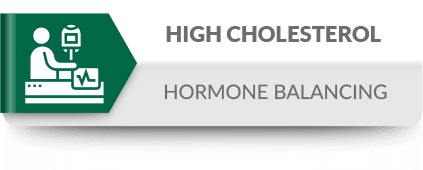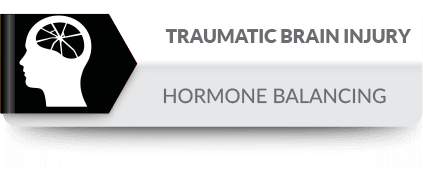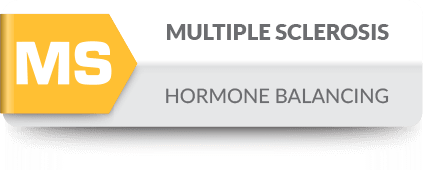
HORMONE BALANCING ENDOCRINOLOGY
Hormones play a crucial role in facilitating communication between cells in the body and regulating essential processes. When hormone levels are imbalanced, it can lead to a range of medical problems.
At CCIM, we specialize in hormone balancing and endocrinology, aiming to address the underlying causes of medical problems related to hormone imbalances. We utilize advanced testing methods such as blood, saliva, and urine (DUTCH) tests to comprehensively assess hormone levels and tailor treatment plans accordingly. Dr. DV, a member of the American Association of Clinical Endocrinologists, brings extensive experience in using hormone therapies to treat various medical conditions.
If you're experiencing any of the following conditions resulting from dysbiotic gut inflammation, our endocrinology services can help:
- Migraines and Estrogens
- Vertigo and Estrogens
- Autoimmunity promoted by Estrogen Dominant Physiology
- Gut dysbiosis and estrogen-mediated illnesses
- Tinnitus associated with endocrine hypofunction
- Chronic pelvic pain syndrome and gut dysbiosis
- Endocrinopathy of CRPS in women
- Cortisol dysfunction leading to chronic pain
Our unique specialty lies in restoring hormone balance while simultaneously repairing the microbiome, as dysbiotic gut inflammation can contribute to endocrine issues.

Our comprehensive approach to endocrinology involves the following steps:
Schedule a consultation to discuss your specific needs and concerns.
Undergo hormone testing using blood, saliva, or urine samples for a comprehensive assessment.
Begin treatment, which may include custom compounded bioidentical hormone formulas or other hormone therapies like Vitamin D, Thyroid, Insulin, IGF1, peptide hormone treatments, or hormone-lowering treatments such as estrogen-lowering aromatase inhibitors or DHT-lowering 5-alpha reductase inhibitors.
After two weeks of treatment, provide feedback on your experience to optimize the treatment plan.
We also address specific hormone-related topics and their connections to various medical conditions. Some examples include:
- Cortisol Physiology: Exploring the role of cortisol and its effects on inflammation, tissue degeneration, and chronic pain.
- Salivary Cortisol Testing: A highly accurate method for assessing cortisol levels.
- Estrogen: Examining its impact on migraines, vertigo, gut dysbiosis, and autoimmune diseases.
- Progesterone: Its potential for treating migraine, neuropathic pain, and its effects on nerve regeneration and acne.
- Testosterone: Dispelling misconceptions about testosterone therapy and its relationship with cancer risk.
- Pregnenolone: Its role in brain health, fatigue, and traumatic brain injuries.
- Autoimmune Disease: How bioidentical hormone treatments can decrease inflammation, improve immune system function, and alleviate menopause symptoms without significant side effects.
For specific conditions such as scleroderma, multiple sclerosis, prostate issues, or chronic pain, we provide relevant research studies and information about the potential benefits of hormone treatments.
If you're interested in hormone balancing and endocrinology services, we encourage you to reach out by providing your name, preferred contact details, and a brief description of your ideal care package. Our team will be glad to assist you in setting up a personalized plan that suits your needs.
















- Estrogen lowering aromatase inhibitors (anastrozole)
- Dihydrotestosterone (DHT) lowering 5-alpha reductase inhibitor treatments (finasteride)
ENDOCRINOLOGY
CORTISOL PHYSIOLOGY https://www.ncbi.nlm.nih.gov/pmc/articles/PMC4263906/
- 11 beta HSD1 - promotes conversion of inactive cortisone to cortisol, promotes Cushing-like fat redistribution, promotes weight gain, obesity, metabolic syn, glaucoma, bone resorption
- Chronic inflammation leads to damage to the cortisol receptor
- Chronic cortisol secretion leads to down-regulation / resistance of the cortisol receptor to cortisol binding
- Cortisol's job is to regulate the inflammatory response; cortisol dysfunction therefore leads tissues susceptible to intracellular and tissue degeneration / breakdown, celluar death and aging
- Cortisol dysfunction leads to chronic pain
- SALIVARY CORTISOL TESTING IS HIGHLY ACCURATE
- MORE SALIVARY CORTISOL STUDIES
- Chest. 2011;140(5):1216-1222
- Neuropsychobiology. 1989;22(3):150-69
- Exp Clin Endocrinol Diabetes 2005; 113(4): 225-230
- The British Journal of Psychiatry Jan 2004, 184 (2) 136-141
- Restoring normal cortisol function in adrenal insufficient patients https://www.ncbi.nlm.nih.gov/pmc/articles/PMC3475279/
Patterns of Salivary Estradiol and Progesterone across the Menstrual Cycle:
ESTROGEN
- Migraine & Estrogens
- Estrogen and vertigo
- Estrogen Dominant Physiology promotes autoimmunity:
- Estrogen and gut dysbiosis: Repair of the microbiome measurably improves estrogen-mediated illness
MISCELLANEOUS
- Tinnitus is associated with endocrine hypofunction: https://jamanetwork.com/journals/jama/article-abstract/261359
- About CLOMID: http://contemporaryobgyn.modernmedicine.com/contemporary-obgyn/news/clinical/clinical-pharmacology/clomiphene-citrate-use-ovulation-induction-wh?page=full
ANABOLICS / ANDROGENS
- Oxandrolone 20mg daily x 3mo -> ReMyelination, increase muscle generation, reinnervation of muscle https://www.ncbi.nlm.nih.gov/pmc/articles/PMC4629627/
PROGESTERONE
Progesterone treatment for migraine:
Progesterone to prevent and treat neuropathic pain:
- https://www.ncbi.nlm.nih.gov/pmc/articles/PMC5020818/
- https://www.ncbi.nlm.nih.gov/pmc/articles/PMC3085268/
- http://endocomprehensive.blogspot.com/2014/04/progesterone-and-nerve-pain.html
- https://www.researchgate.net/figure/Effect-of-progesterone-administration-on-neuropathic-pain-associated-behaviorsafter_fig1_51453432
Neuroregenerative effects of progesterone:
Progesterone for acne:
TESTOSTERONE
- Testosterone therapy does not increase cancer risk:
- Maca raises testosterone levels: https://www.ncbi.nlm.nih.gov/pmc/articles/PMC3070333/
PREGNENOLONE
- https://www.grc.com/health/research/Pregnenolone/Pregnenolone.pdf
- for brain health and fatigue:
- https://pdfs.semanticscholar.org/5bcc/dc43155b0b14ef3da1c2dcc2a3751887665a.pdf
TBI & Endocrinology / Dr Mark Gordon:
Chronic pelvic pain syndrome and gut dybiosis
Endocrinopathy of CRPS in women:
Cortisol for chronic pain
- https://www.ncbi.nlm.nih.gov/pubmed/25827960
- http://www.journalofprolotherapy.com/pdfs/issue_08/issue_08_06_hormones_for_pain.pdf
- https://www.practicalpainmanagement.com/treatments/hormone-therapy/hormone-treatments-chronic-intractable-pain
- http://hormonesandpaincare.com/pages/wp-content/uploads/2016/11/Chp5-Normal_Hormone_Serum_Levels_Essential_for_Chronic_Pain_Management.pdf
LDN for chronic pain
AUTOIMMUNE DISEASE
Bioidentical Hormone treatments in women decrease inflammation, decrease vascular inflammation/heart attack and stroke risk, improve immune system function, decrease depression, relieve menopause symptoms, improves health outcomes based on this 3-year study:
https://www.ncbi.nlm.nih.gov/pubmed/23627249
And no side effects / blood clot / cancer risks were noted
Impaired estrogen signaling/metabolism is linked to autoimmune diseases
- https://www.sciencedaily.com/releases/2018/05/180531131116.htm
- https://www.frontiersin.org/articles/10.3389/fimmu.2018.02279/full
We address this by using progesterone and emphasizing a plant-based diet to optimize estrogen metabolism and signaling. Progesterone regulates the estrogen receptor, and a plant-based diet promotes optimal excretion of inflammatory estrogen metabolites.
Progesterone (and testosterone) suppresses autoimmune inflammation:
https://www.researchgate.net/publication/51919501_Progesterone_and_Autoimmune_Disease
https://www.ncbi.nlm.nih.gov/pubmed/7923746
PROGESTERONE FOR SCLERODERMA
- Fibroblasts are activated in scleroderma and create scar tissue in the lung in pulmonary scleroderma. Progesterone inhibits fibroblast activity https://www.karger.com/Article/PDF/233673
- T cell activation in scleroderma promotes inflammation; progesterone inhibits T cell activation https://www.nature.com/articles/mi201735
- Scleroderma is characterized by Th1 immune activation; progesterone inhibits this and promotes a Th2 immune activation
Testosterone for MS: https://www.ncbi.nlm.nih.gov/pmc/articles/PMC2724009/
PROSTATE
Microbiome & Prostate disease
https://www.ncbi.nlm.nih.gov/pubmed/29795140
https://www.ncbi.nlm.nih.gov/pubmed/31493090
Testosterone for prostate cancer patients:
- https://www.ncbi.nlm.nih.gov/pmc/articles/PMC4647137/
- https://www.hopkinsmedicine.org/news/media/releases/surprise_high_dose_testosterone_therapy_helps_some_men_with_advanced_prostate_cancer
- https://pcri.org/insights-blog/2018/7/25/is-testosterone-the-new-therapy-for-prostate-cancer
CHRONIC PAIN:
LDN 3mg at night (provided by compounding pharmacist)
- https://www.ldnresearchtrust.org/content/low-dose-naltrexone-and-chronic-pain-pradeep-chopra-md
- https://www.ncbi.nlm.nih.gov/pmc/articles/PMC3962576/
- https://academic.oup.com/painmedicine/article-abstract/15/5/883/1812526?redirectedFrom=fulltext
Hormone Treatments: Cortisol, Pregnenolone, DHEA, Testosterone, Progesterone, IGF1
- Cortisol for pain in opioid patients: https://www.ncbi.nlm.nih.gov/pubmed/25827960
- http://www.journalofprolotherapy.com/pdfs/issue_08/issue_08_06_hormones_for_pain.pdf
- https://www.practicalpainmanagement.com/treatments/hormone-therapy/hormone-treatments-chronic-intractable-pain
- http://hormonesandpaincare.com/pages/wp-content/uploads/2016/11/Chp5-Normal_Hormone_Serum_Levels_Essential_for_Chronic_Pain_Management.pdf
- https://www.ncbi.nlm.nih.gov/pmc/articles/PMC5020818/ https://www.ncbi.nlm.nih.gov/pmc/articles/PMC3085268/ http://endocomprehensive.blogspot.com/2014/04/progesterone-and-nerve-pain.html
- https://www.researchgate.net/figure/Effect-of-progesterone-administration-on-neuropathic-pain-associated-behaviorsafter_fig1_51453432
